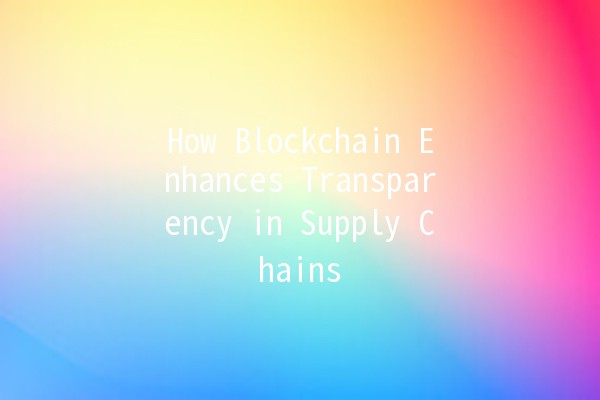




In today's global economy, transparency in supply chain processes is more essential than ever. Companies are increasingly pressured to provide clear and accurate information about where their products come from and how they are made. Blockchain technology offers a robust solution to this challenge by enhancing transparency, improving traceability, and fostering trust among stakeholders.
Blockchain technology functions as a decentralized digital ledger that records transactions across multiple computers. This ensures that the recorded data cannot be altered retroactively without altering all subsequent blocks and gaining consensus from the network. Here’s how blockchain can significantly enhance supply chain transparency:
Explanation: Blockchain provides an immutable record of transactions. Once data is entered, it cannot be modified or deleted, ensuring a permanent record of each stage of the supply chain.

Application Example: In the food industry, companies like Walmart have implemented blockchain to track the movement of produce from farm to store. For instance, if a food safety issue arises, Walmart can trace the journey of lettuce back to the specific farm and prevent contaminated products from reaching consumers.
Explanation: Each transaction on the blockchain can be linked to the previous one, offering a detailed traceable history of a product's journey through the supply chain.
Application Example: Companies like IBM and Maersk are collaborating on a blockchain solution that tracks shipping containers. This allows companies to see where their goods are at any point in the shipping process, thereby reducing delays and improving reliability.
Explanation: Smart contracts are selfexecuting contracts with the terms of the agreement directly written into code. These contracts trigger actions when predefined conditions are met.
Application Example: In automotive supply chains, manufacturers can use smart contracts to automatically release payments once components are delivered and verified, minimizing disputes and speeding up the payment process.
Explanation: Blockchain allows for decentralized information sharing, meaning all parties involved in the supply chain can access the same information without the need for a central authority, reducing mistrust.
Application Example: The diamond industry uses blockchain to confirm the origin of diamonds, providing buyers assurance that they are purchasing ethically sourced stones free from conflict.
Explanation: The transparency offered by blockchain increases accountability among stakeholders, as all actions taken are recorded and can be audited.
Application Example: In the clothing industry, brands like Everledger are tracking the production journey of textiles. This helps ensure labor practices are ethical and that manufacturers comply with environmental regulations.
Implementing blockchain in your supply chain can be a complex endeavor, but several strategies can facilitate the integration process. Here are five practical tips:
Description: Before a fullscale implementation, begin with small pilot projects to understand the technology's implications and effectiveness.
Application: A beverage company might start with tracking the sourcing of a single ingredient like sugar. By assessing the pilot's outcomes, they can refine their approach before expanding.
Description: Collaborating with other companies in your supply chain can foster data sharing and transparency that benefits all involved.
Application: Automotive manufacturers can partner with parts suppliers to create a shared blockchain network that tracks parts from origin through assembly to delivery.
Description: Ensure your team has a clear understanding of blockchain technology and its potential applications within your organization.
Application: Offering training sessions can help personnel understand how blockchain will change their workflows, especially in procurement and logistics.
Description: Blockchain solutions must comply with regulatory requirements and be secure against potential cyber threats.
Application: Work with cybersecurity experts to create a safe, compliant blockchain system that protects sensitive information from unauthorized access.
Description: A blockchain implementation isn't a "set it and forget it" solution. Regular evaluations help identify areas for improvement.
Application: After six months, analyze the performance of your blockchain system in relation to transparency goals. Gather feedback from users and stakeholders to find ways to optimize the system.
Blockchain technology is a decentralized digital ledger that records transactions securely and transparently across multiple computers, making it difficult to modify or hack.
Blockchain improves transparency by providing an immutable record of transactions, allowing all stakeholders to trace a product’s journey accurately, ensuring compliance and ethical practices.
Industries such as food and beverage, pharmaceuticals, fashion and apparel, and electronics are among those that can significantly benefit from enhanced transparency through blockchain technology.
Smart contracts are selfexecuting contracts programmed to enforce terms of an agreement automatically when predetermined conditions are met, facilitating faster and more reliable transactions in supply chains.
Some challenges include integration costs, complexity in changing existing systems, ensuring data privacy, and overcoming resistance to change from stakeholders.
While blockchain technology offers robust security features, it is crucial to implement additional cybersecurity measures and protocols to protect networks and sensitive data from cyber threats.
Incorporating blockchain into supply chains can yield significant benefits by enhancing transparency and accountability, boosting efficiency and trust among all stakeholders involved. Organizations leveraging this transformative technology can gain a competitive edge in an everevolving global market.